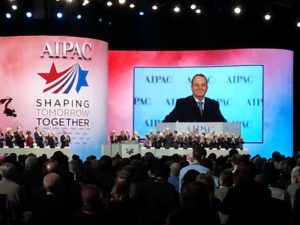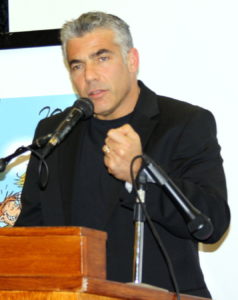 Day One of the AIPAC Policy Conference has come to a close. By my count I saw seven major speakers, and a dozen minor ones. I ate one solid Starbucks pastry, one mediocre chicken sandwich, a decent buffet dinner, and injected roughly five and a half cups of coffee straight into my veins. I saw a paralyzed man walk, a blind woman see, a car warn the driver that he had veered out of his lane, and this crazy superconductor demonstration. All of that was true. The AIPAC “Innovation Showcase” had some truly inspiring, mind-boggling inventions.
Day One of the AIPAC Policy Conference has come to a close. By my count I saw seven major speakers, and a dozen minor ones. I ate one solid Starbucks pastry, one mediocre chicken sandwich, a decent buffet dinner, and injected roughly five and a half cups of coffee straight into my veins. I saw a paralyzed man walk, a blind woman see, a car warn the driver that he had veered out of his lane, and this crazy superconductor demonstration. All of that was true. The AIPAC “Innovation Showcase” had some truly inspiring, mind-boggling inventions.
Most of the speakers today focused on Israel’s security. Israeli Ambassador to the United States Michael Oren played up America’s relationship and commitment to Israel’s safety and security. He had harsh words about Iran, Syria, Hamas and all of Israel’s enemies. The next speakers, Dennis Ross and Elliott Abrams, echoed many of those same points, but spoke from an outside, unofficial perspective.
The afternoon plenary session started with Senator John Cornyn echoing Ambassador Oren almost word-for-word, saying, “If Iran goes nuclear it could be the ultimate ‘game ender’ for the Middle East.” For those that had Game Change, or similar, on their AIPAC Bingo cards, today was a bonanza.
We then heard more talk about Iran and Syria from Canadian Foreign Minister John Baird and former Italian Foreign Minister (and underling of Tony Soprano) Franco Frattini.
“And I ran. Iran so far away…”
Finally, Israeli Defense Minister Ehud Barak took the podium and talked more about the threats to Israel. Interestingly, he thanked President Obama for his support, and—instead of thanking former Secretary of State Clinton, or Vice President Biden, or current Secretary of State John Kerry—he thanked Secretary of Defense (and former Director of the CIA) Leon Panetta. A clear message about what the Israeli government is most thankful for.
Tomorrow we’ll hear from Biden, Prime Minister Netanyahu, Senator John McCain, and more. They’ll all likely speak to the same issues regarding Iran, Hamas, and threats to Israel’s future.
 People we didn’t, and won’t see at the conference: Yair Lapid, Shelly Yachimovich, Naftali Bennet, and other rising stars of a new generation of Israeli leaders. These three lead the second, third, and fourth largest parties in the Knesset, respectively. Each of them was elected for different reasons, but all were elected on issues other than peace and security. Yes, it’s important to talk about Iran, et al; but when will the major Israel lobby in Washington wise to the fact that Israel is moving on?
People we didn’t, and won’t see at the conference: Yair Lapid, Shelly Yachimovich, Naftali Bennet, and other rising stars of a new generation of Israeli leaders. These three lead the second, third, and fourth largest parties in the Knesset, respectively. Each of them was elected for different reasons, but all were elected on issues other than peace and security. Yes, it’s important to talk about Iran, et al; but when will the major Israel lobby in Washington wise to the fact that Israel is moving on?
Between the two plenary sessions, I attended a smaller breakout session that addressed this very issue. It featured a former Member of Knesset, Einat Wilf (no known relation to Zygi), and Dany Gliksberg, founder and deputy director of Ayalim, an organization I’ve written about in the past.
They talked about a new wave of Israeli leaders that aren’t shackled by old mentalities. Distinctions like whether someone traces their roots back to the First Aliyah, or the Second, or whether they’re an American Israeli or Russian Israeli, all don’t matter as much anymore. Like many Americans don’t define themselves by a certain practice and claim to be “Just Jewish,” so this new generation of Israelis consider themselves, “Just Israel.”
Where once there was competition and fighting among MKs, this new generation is much more friendly and conciliatory. Instead of fiery speeches against each other, Knesset is filled with emotional speeches that are complimentary in tone.
The Israeli press has apparently taken to referring to this Knesset as a “Knesset of Care Bears.”
Because of people like Dany Gliksberg, this Israeli generation has been imbued with the same Zionist spirit of their grandparents, something missing from their parents’ generation. The grandparents built a country out of nothing. The parents fought for and defended that country. The kids have rediscovered that mission that bonded their grandparents, and they are working to improve the country with revived Zionist zeal.
“Despite what you might hear elsewhere at this conference,” Gliksberg said, “Israel is a fact. It’s not going to go anywhere.” It wasn’t as clear for his parents, and definitely not for his grandparents, but Gliksberg says that Israel’s continued existence is not a concern for the average Israeli. It’s always present, but Israelis are more concerned about the cost of rent, or the Haredim serving in the military, or in Gliksberg’s case, building communities in the Negev.
Wilf talked about how she was interviewed by the BBC after the recent elections. The BBC wanted to know what the election meant for peace prospects. “It was like we were having two parallel conversations,” she said. The elections, she said, had nothing to do with peace.
Yes, Netanyahu still leads the largest party in the Knesset, and he talks at length about peace and security. But the tide is clearly changing. Taken together, the three new young leaders won more seats than Netanyahu’s old guard, and only look to be getting stronger. Israelis have shifted their focus. Will AIPAC?
(Lapid photo: Wikipedia)

